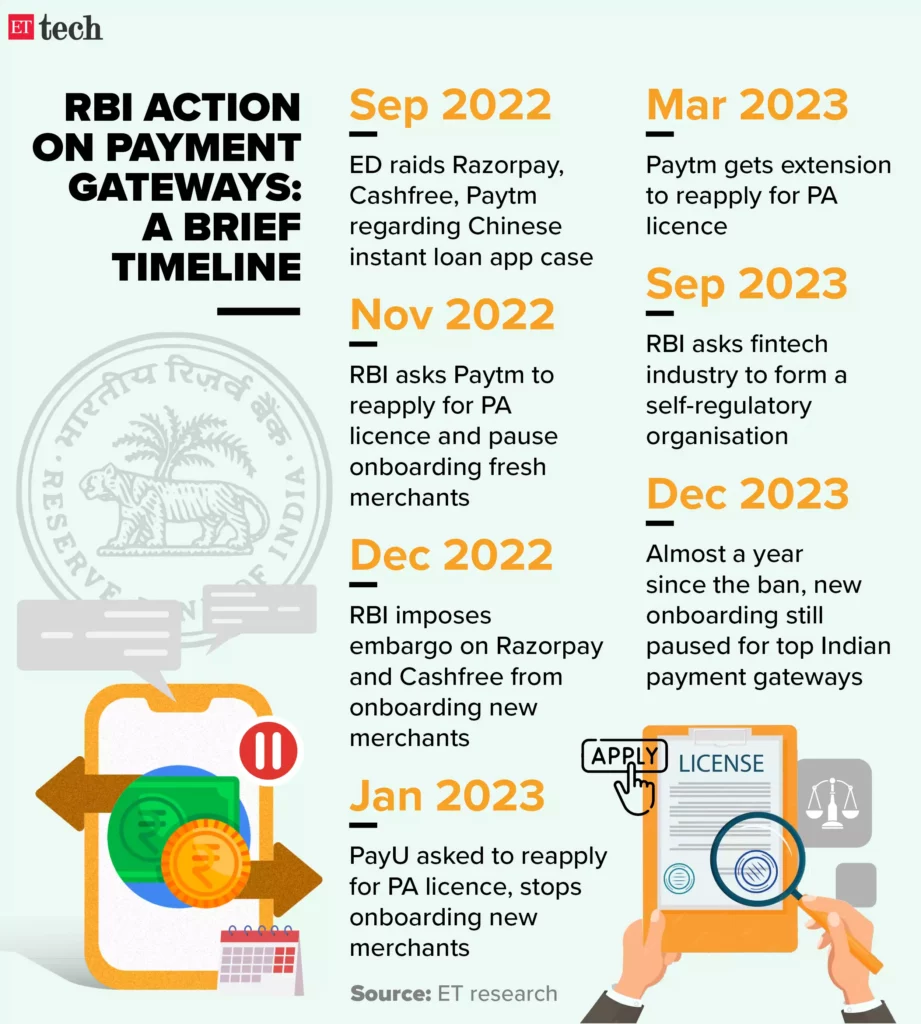In a significant regulatory move last year, the Reserve Bank of India (RBI) imposed a ban on major payment aggregators like Paytm, Razorpay, Cashfree, and PayU from onboarding new merchants and businesses. Initially presumed to be a short-lived setback, this regulatory embargo has persisted for almost a year, forcing these venture capital-backed firms to seek alternative revenue streams. This situation has heightened concerns among entrepreneurs and investors.
The extended limitations imposed by the RBI have presented challenges for India’s payment startups, disrupting their previously anticipated hyper-growth trajectory. This year’s slowdown in revenue growth may impact their ability to substantiate valuations, especially with the hindrance caused by the absence of new merchant onboarding. This underscores the need for diversification and adaptation to alternative revenue sources.

Diversification Strategies
In a calculated strategic response to mitigate the missed opportunities from the RBI ban, online payment aggregators are proactively diversifying their focus. Recognizing the potential in international markets, these payment gateway companies are increasingly turning their attention beyond Indian borders. Razorpay, for instance, has expanded operations to Malaysia.
In addition, Razorpay has shifted its focus towards offering new products to existing merchants, aiming to increase revenue per customer. The company has introduced value-added offerings for the direct-to-customer segment and the broader payments ecosystem. Razorpay’s Chief Operating Officer, Rahul Kothari, highlighted a shift in revenue dynamics, with the share of revenue from new customers decreasing from 30% to 12-15%.
Moreover, Razorpay is leveraging its acquisition of offline payment provider Ezetap to tap into digital payments made at retail outlets. The company is doubling down on Ezetap not only for merchant addition but also through strategic investments. This move is intended to compensate for potential revenue loss from online transactions by generating subscription income from offline merchants.
Meanwhile, Paytm is redirecting its efforts towards offline payments, catering to a market segment unaffected by the ban. The payment giant reported 9.12 billion merchant transactions in the September quarter, settling Rs 4.5 lakh crore worth of payments.
Simultaneously, Cashfree is in the active process of developing an array of value-added services atop its payment platform.
PayU India, another major player, reported $211 million in revenue from its core payments business in the first half of the current fiscal year, with a year-on-year revenue growth of 15%, primarily driven by its existing merchant base and subscription products like Wibmo. PayU has also reapplied for the payment aggregator license and is actively engaging with existing merchants on various levels to boost total payment volume.
The scrutiny from the Indian government has significantly complicated the situation for digital payment aggregators in the country. Razorpay, Paytm, and Cashfree were entangled in the Chinese loan app case, prompting the Enforcement Directorate to initiate investigations.
The chief executive of a prominent payments company offers valuable insights into the pivotal role of new merchant onboarding when pursuing ambitious growth targets.
“If you set a 60% growth target for a year, 20-25% can come from your existing base, but the remaining 35-40% will come from new merchant onboarding. That is the business impact,” a CEO of a major payments firm said.
The extended embargo on new merchant onboarding has created a ripple effect, potentially leading existing clients to reconsider their partnerships. Amidst heightened competition and an exploration of new business avenues, some larger-scale merchants are contemplating diversifying their partnerships. The uncertainty surrounding the embargo has prompted these businesses to adopt a precautionary approach, seeking to onboard newer gateways to mitigate the risk of service disruptions in the future.
Opportunities for New Players
RBI’s ban on Paytm and other established payment companies has facilitated accelerated growth in merchant onboarding for emerging players such as Plural from Pine Labs, PhonePe, Innoviti Payments, Billdesk and CCAvenue. These payment companies are actively capitalizing on the regulatory shift by aggressively onboarding merchants.
The government’s emphasis on digitizing citizen payments has also positioned players like Billdesk and CCAvenue as frontrunners in the evolving payments landscape. CCAvenue, a listed fintech, reported an impressive 79% surge in its total payment value, reaching Rs 1.78 lakh crore in the second quarter of the current fiscal year.
Although diversification into new business lines strengthens these online payment startups within their domains, the key challenge remains in digitizing new merchants, which is a crucial aspect of any payment business. Until the new onboarding situation is resolved, India’s payment industry faces a challenging phase characterized by strategic shifts, regulatory uncertainties, and the need for innovative solutions.

